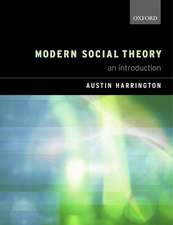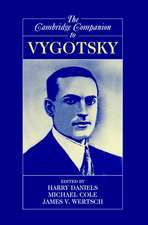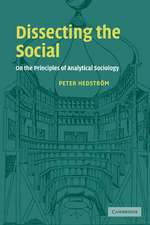German Cosmopolitan Social Thought and the Idea of the West: Voices from Weimar
Autor Austin Harringtonen Limba Engleză Hardback – 18 mai 2016
Preț: 776.87 lei
Preț vechi: 903.34 lei
-14% Nou
Puncte Express: 1165
Preț estimativ în valută:
148.67€ • 161.44$ • 124.88£
148.67€ • 161.44$ • 124.88£
Carte tipărită la comandă
Livrare economică 22 aprilie-06 mai
Preluare comenzi: 021 569.72.76
Specificații
ISBN-13: 9781107110915
ISBN-10: 1107110912
Pagini: 450
Dimensiuni: 152 x 229 x 25 mm
Greutate: 0.77 kg
Editura: Cambridge University Press
Colecția Cambridge University Press
Locul publicării:New York, United States
ISBN-10: 1107110912
Pagini: 450
Dimensiuni: 152 x 229 x 25 mm
Greutate: 0.77 kg
Editura: Cambridge University Press
Colecția Cambridge University Press
Locul publicării:New York, United States
Cuprins
Introduction; 1. Social theory and the West; 2. Europa in Weimar; 3. Liberal social theorists in Germany, 1914–33; 4. European nationhood after the Great War; 5. A Romano-Germanic nexus; 6. Universal history; 7. Humanism and Europe; 8. European nihilism?; 9. Protesting the West: yesterday and today.
Recenzii
'This is a significant book that questions the received view about classical social theory. With considerable erudition and a careful reading of a wide range of the most important thinkers in early twentieth-century Germany, Harrington shows that these theorists had already anticipated some of the ideas that are more commonly associated with contemporary thought. He also demonstrates that the traditional view of the decline of cosmopolitanism needs to be revisited.' Gerard Delanty, University of Sussex
'Germany and the West remains an important topic, although fortunately the time of confrontation is over. This book, by re-evaluating the writings of liberal German social theorists, recalibrates the image of German intellectual history before Nazism, and teaches us the contemporary relevance of their attempts to combine universality and particularity in an appropriate manner.' Hans Joas, Humboldt University, Berlin, and University of Chicago
'A masterful reinterpretation of universalist moral visions expressed during Germany's Weimar Republic. Harrington is unapologetic in his championing of cosmopolitanism against its stalwart sceptics and is unflinching in his defence of this vision's viability in the face of its well-meaning but pessimistic doubters. The book will take an important place in the study of Weimar culture and its legacies, and in contemporary debates over the normative dimensions of globalization.' John P. McCormick, University of Chicago
'Harrington's book is a learned analysis of a particular branch of German liberal thought that emerged between the end of WWI and the beginning of the Third Reich. Concentrating on nine German thinkers - among them Georg Simmel, Karl Mannheim, and Max Weber - Harrington (sociology, Univ. of Leeds, UK) skillfully demonstrates that a sophisticated, European (although not Eurocentrist), non-Marxist alternative to National Socialism existed in the years before Adolf Hitler came to power.' R. W. Lemmons, CHOICE
'It might seem as if everything about the Weimar Republic and its intellectual friends and enemies had already been written. But in the run-up to the hundredth anniversary of the founding of the first German democracy, the deck has been reshuffled. The new study by Austin Harrington, a sociologist and philosopher at the University of Leeds, is among those offering new perspectives.' Gangolf Hübinger, Max Weber Studies
'Germany and the West remains an important topic, although fortunately the time of confrontation is over. This book, by re-evaluating the writings of liberal German social theorists, recalibrates the image of German intellectual history before Nazism, and teaches us the contemporary relevance of their attempts to combine universality and particularity in an appropriate manner.' Hans Joas, Humboldt University, Berlin, and University of Chicago
'A masterful reinterpretation of universalist moral visions expressed during Germany's Weimar Republic. Harrington is unapologetic in his championing of cosmopolitanism against its stalwart sceptics and is unflinching in his defence of this vision's viability in the face of its well-meaning but pessimistic doubters. The book will take an important place in the study of Weimar culture and its legacies, and in contemporary debates over the normative dimensions of globalization.' John P. McCormick, University of Chicago
'Harrington's book is a learned analysis of a particular branch of German liberal thought that emerged between the end of WWI and the beginning of the Third Reich. Concentrating on nine German thinkers - among them Georg Simmel, Karl Mannheim, and Max Weber - Harrington (sociology, Univ. of Leeds, UK) skillfully demonstrates that a sophisticated, European (although not Eurocentrist), non-Marxist alternative to National Socialism existed in the years before Adolf Hitler came to power.' R. W. Lemmons, CHOICE
'It might seem as if everything about the Weimar Republic and its intellectual friends and enemies had already been written. But in the run-up to the hundredth anniversary of the founding of the first German democracy, the deck has been reshuffled. The new study by Austin Harrington, a sociologist and philosopher at the University of Leeds, is among those offering new perspectives.' Gangolf Hübinger, Max Weber Studies
Descriere
Harrington draws on neglected sources in early twentieth-century German social thought to address core questions in current social science.

















